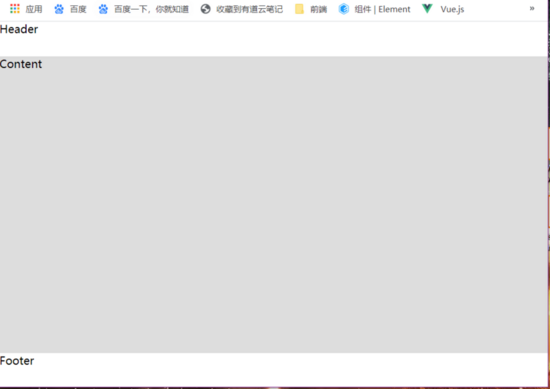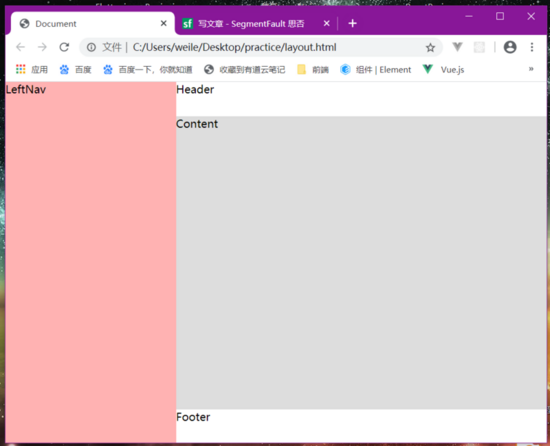使用flex布局轻松实现页面布局的示例代码
废话不多说,直接上代码:
1、上中下布局:
<!DOCTYPE html>
<html lang="en">
<head>
<meta charset="UTF-8">
<meta name="viewport" content="width=device-width, initial-scale=1.0">
<title>Document</title>
<style>
body {
position: absolute;
left: 0; right: 0; top: 0; bottom: 0;
padding: 0; margin: 0;
display: flex;
flex-direction: column;
}
.header, .footer {
height: 50px;
}
.body {
flex-grow: 1;
background-color: #DDD;
}
</style>
</head>
<body>
<div class="header">Header</div>
<div class="body">Content</div>
<div class="footer">Footer</div>
</body>
</html>
显示效果如下:

2、左右布局:
<!DOCTYPE html>
<html lang="en">
<head>
<meta charset="UTF-8">
<meta name="viewport" content="width=device-width, initial-scale=1.0">
<title>Document</title>
<style>
body {
position: absolute;
left: 0; right: 0; top: 0; bottom: 0;
padding: 0; margin: 0;
display: flex;
}
.left, .right {
height: 100%;
}
.left {
width: 250px;
background-color: rgba(255,0,0,0.3);
}
.right {
display: flex;
flex-direction: column;
}
.header, .footer {
height: 50px;
}
.right, .content {
flex-grow: 1;
}
.content {
background-color: #DDD;
}
</style>
</head>
<body>
<div class="left">LeftNav</div>
<div class="right">
<div class="header">Header</div>
<div class="content">Content</div>
<div class="footer">Footer</div>
</div>
</body>
</html>
页面的效果如下:

下面对几个关键的样式加以说明,这样就可以设计出任何想要的布局了:
flex-grow: 1; // 表示容器在主轴的宽度有多余时该子项【本文由:http://www.yidunidc.com/mgzq.html复制请保留原URL】占据剩余空间 position:absolute; left: 0;right: 0; top: 0; bottom: 0; // 这一组样式让该元素占满定位的父级元素
到此这篇关于使用flex布局轻松实现页面布局的示例代码的文章就介绍到这了,更多相关flex页面布局内容请搜索海外IDC网以前的文章或继续浏览下面的相关文章,希望大家以后多多支持海外IDC网!
【来源:美国cn2服务器 转载请说明出处】